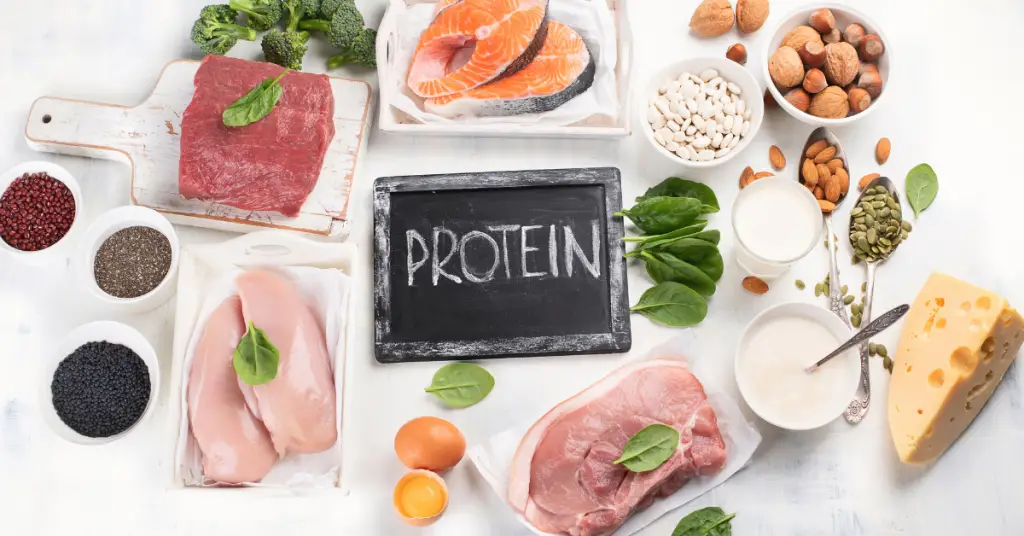A piece of standard advice in the health world is to eat more protein. Consequently, as I experimented with my diet, I wondered if I should eat more protein when logging my food (I rarely consume more than 80 grams of protein on any given day, and the app I used recommended at least 124 grams). This post examines the effect of protein on weight loss, whether overeating or undereating protein can harm your health, and how much protein you should eat.
How Protein Helps You Lose Weight
If you are wondering whether you should eat more protein to lose weight, you need to understand the effect of protein on your body for weight loss.
Known for its crucial role in muscle building and repair, protein has garnered increasing attention for its potential to aid in weight loss. While protein’s ability to promote satiety and boost metabolism has been widely acknowledged, recent research has shed light on the multifaceted ways in which protein aids in weight management. In fact, a high-protein diet could be more effective than a low-carb diet for weight loss.
Here are some ways protein helps you lose weight: it increases satiety, boosts your metabolism, preserves muscle mass, and enhances fat-burning.

Protein Increases Satiety
One of the key factors contributing to weight gain is overeating, often driven by a persistent feeling of hunger. Protein has been found to enhance satiety, thereby reducing calorie intake. Compared to carbohydrates and fats, protein takes longer to digest, leading to a prolonged feeling of fullness. Additionally, protein stimulates the release of appetite-regulating hormones, such as peptide YY and glucagon-like peptide-1 (GLP-1), further enhancing satiety. Incorporating protein-rich foods into meals and snacks can help control hunger, curb cravings, and prevent excessive calorie consumption, ultimately facilitating weight loss.
Protein Boosts Your Metabolism (It’s Thermogenic)
The thermic effect of food (TEF) refers to the energy expenditure required for digestion, absorption, and metabolism of nutrients. Among the macronutrients, protein has the highest TEF. Approximately 20-30% of the calories derived from protein are used during digestion and processing, compared to only 5-10% for carbohydrates and 0-3% for fats. This higher energy expenditure associated with protein digestion can contribute to an overall increase in metabolic rate, aiding in weight loss efforts. By incorporating protein-rich foods into the diet, individuals can potentially burn more calories, even at rest.
Protein Preserves Muscle Mass
The body often breaks down muscle tissue and fat stores during weight loss. This loss of muscle mass can significantly hinder weight loss efforts as muscle plays a crucial role in maintaining a higher metabolic rate. Protein consumption is essential for preserving lean muscle mass while promoting fat loss. Adequate protein intake and regular exercise help promote muscle protein synthesis, minimizing muscle breakdown and preserving muscle mass. By preserving muscle tissue, protein ensures a higher metabolic rate, allowing individuals to burn more calories throughout the day and facilitating sustainable weight loss.
Protein Enhances Fat-Burning
Protein impacts weight loss beyond its satiating effects and muscle preservation properties. Research suggests protein can stimulate the body’s fat-burning processes, increasing fat loss. High-protein diets have been shown to promote fat oxidation, meaning that the body is more efficient at utilizing stored fat as an energy source. Furthermore, protein intake can decrease fat mass while preserving or increasing lean body mass, resulting in a favorable body composition change. Protein is a valuable tool in weight loss endeavors by boosting fat burning and facilitating the maintenance of a leaner physique.

How Much is Too Much Protein?
Looking online, most sources will tell you that consuming more than two grams of protein per pound of body weight daily is excessive. However, this answer isn’t necessarily the correct answer. There is a wide range of recommendations and cautions.
Are There Risks Associated With Eating Too Much Protein?
What happens if you overeat protein? Most sources confirm an increase in cancer risks. Aside from this, other minor consequences include digestive upsets, diarrhea, and bad breath.
On the other hand, some studies also suggest that excessive protein intake could accelerate aging and increase chronic diseases.
Cancer Risks
A large 2014 study found that a high protein diet during middle age was associated with a fourfold increase in cancer risks. In the study, a protein consumption of 20 percent or more of the total calories was considered high protein (which would amount to 100 grams of protein for a 2000-calorie diet). When looking at these types of studies, one must remember that the way protein is sourced and cooked isn’t considered. It is possible that other factors could be at stake.

Accelerated Aging
Restricting protein intake may promote healthy cellular aging. Restricting protein intake reduces the levels of IGF-I and the mammalian target of rapamycin (mTOR).
The interplay between IGF-I and mTOR is significant. IGF-I activates the mTOR pathway, promoting protein synthesis and cell growth. Conversely, mTOR activation can stimulate IGF-I production, creating a positive feedback loop that further enhances cellular growth and proliferation.
Elevated levels of IGF-I and increased mTOR activity are observed in various physiological and pathological conditions, including normal growth and development during childhood and adolescence and certain disease states such as cancer. In cancer, dysregulation of the IGF-I/mTOR pathway can contribute to uncontrolled cell growth and tumor formation.
It’s worth noting that while IGF-I and mTOR are involved in critical physiological processes, excessive or dysregulated activation of these pathways can have detrimental effects. In some cases, aberrant IGF-I or mTOR activity has been associated with age-related diseases, metabolic disorders, and cancer progression. Therefore, understanding the regulation and modulation of these pathways is crucial for maintaining proper cellular homeostasis and developing potential therapeutic interventions.
Elevated levels of IGF-I and increased mTOR activity have been associated with accelerated aging and age-related diseases. These factors promote cell growth, proliferation, and protein synthesis, which can contribute to cellular senescence and accumulating damaged molecules. This, in turn, may lead to impaired cellular function and increased susceptibility to age-related ailments.
On the other hand, some studies suggest that moderate activation of mTOR and controlled levels of IGF-I may benefit aging. These pathways are involved in nutrient sensing and energy metabolism, essential for cellular repair and maintenance. Optimal mTOR activity and IGF-I levels promote tissue regeneration, immune response, and overall health during aging.
The balance between IGF-I and mTOR activity is crucial for healthy aging. Excessive activation of these pathways can be detrimental, while appropriate regulation and modulation may contribute to maintaining cellular homeostasis and delaying age-related decline. Further research is needed to fully understand the intricate mechanisms and potential interventions related to IGF-I, mTOR, and aging.

Chronic Diseases
The impact of protein on chronic diseases can depend on the specific sources and amounts consumed. Some studies have suggested that a high intake of certain types of protein, particularly from animal sources like red meat and processed meats, may be associated with an increased risk of chronic diseases such as cardiovascular disease, type 2 diabetes, and certain cancers. Again, remember that the protein source (for example, grass-fed beef vs. feedlot beef) isn’t considered.
These associations could be due to other components found in animal-based protein sources, such as saturated fats, cholesterol, and additives used in processing. Additionally, cooking methods (such as grilling or frying) can produce potentially harmful compounds.
It’s important to note that individual factors like overall diet, lifestyle, and genetics also influence the development of chronic diseases. Therefore, it’s advisable to maintain a balanced diet that includes a variety of protein sources while also focusing on overall dietary patterns and healthy lifestyle choices to reduce the risk of chronic diseases.

Weight Gain
While increasing protein intake may help with weight loss, upping your calorie consumption to get those grams of protein in may cause weight gain. I have never tracked my foods (except for when I go on a keto cycle or a FMD); I mostly have only one main meal a day, with sometimes two other smaller meals. It seems impossible for me to hit the 124 grams target set by my Lumen. I would have to eat way more calories, which would likely cause weight gain.
What Happens If I Eat Too Little Protein?
According to Dr. Fuhrman and other sources like the Physicians Committee for Responsible Medicine, protein deficiency is almost unheard of in the developed world. However, here’s what protein deficiency would look like:
When protein intake is consistently low, it can result in several adverse effects:
- Muscle loss: Protein is crucial for maintaining and building muscle mass. Inadequate protein intake may lead to muscle wasting and loss of strength.
- Impaired growth and development: Insufficient protein intake in children can hinder proper growth and development, resulting in stunted growth and other developmental issues.
- Weakened immune system: Protein plays a vital role in supporting immune function. Inadequate protein intake can compromise the immune system’s ability to defend against infections and illnesses.
- Slow wound healing: Protein is involved in healing, including forming new tissues. Insufficient protein intake can slow down the healing of wounds and injuries.
- Hormonal imbalances: Certain hormones and enzymes are synthesized using proteins. Low protein intake can disrupt hormone production and lead to imbalances in the body.
It’s important to note that individual protein needs vary depending on age, sex, activity level, and overall health. Consuming adequate protein from diverse sources is generally recommended to meet your body’s requirements.
Regenerate response
How Much Protein Should I Eat a Day
The standard protein recommendation is 1 g per pound of body weight (particularly in the weight-lifting world, but also among health experts over 40), which would be between 110-160 grams daily for the average woman. However, some sources suggest that the average woman needs only 46 grams of protein daily (or 0.75 g per kilo of body weight). At the other end of the spectrum, some recommend a consumption in grams equivalent to your carbs and fat intake (let’s say your total for fat and carbs together is 150 grams; you will consume 150 grams of protein – this is called the P:E Diet).
On one hand, it is hard to overeat protein since protein has a high satiety factor. Do you ever crave chicken or beef when not hungry? Not! When you overeat, you tend to overeat carbs. On the other hand, high-protein diets are not without risks, and optimal longevity and health may require lowering your protein intake.
On the other hand, protein deficiency isn’t a thing, and I don’t see the point in force-feeding protein. Even if I tried, I could never seem to consume 100 grams or more protein. It seems logical to me now that we shouldn’t consume that much. I don’t need it!

High Protein Foods
This last section is for those who wish to increase their protein intake. First, you may want to use a protein intake calculator (I like this one; it provides a wide range of options for you to choose from and specifies where these recommendations come from). If, after looking at these recommendations, you feel the need to increase your protein intake, here’s a list of high-protein foods:
- Lean meats (chicken breast, turkey, lean cuts of beef)
- Chicken breast (cooked, skinless) – 3 ounces (85 grams) provides about 26 grams of protein
- Turkey breast (cooked, skinless) – 3 ounces (85 grams) provides about 26 grams of protein
- Lean cuts of beef (such as sirloin or tenderloin) – 3 ounces (85 grams) provide about 22-26 grams of protein
- Fish and seafood (salmon, tuna, shrimp)
- Salmon (cooked) – 3 ounces (85 grams) provides about 22 grams of protein
- Tuna (canned in water) – 3 ounces (85 grams) provides about 20 grams of protein
- Shrimp (cooked) – 3 ounces (85 grams) provides about 18 grams of protein
- Eggs
- Large egg (cooked) – 1 egg provides about 6 grams of protein
- Dairy products (Greek yogurt, cottage cheese, milk)
- Greek yogurt (plain, non-fat) – 1 cup (240 grams) provides about 23 grams of protein
- Cottage cheese (low-fat) – ½ cup (113 grams) provides about 14 grams of protein
- Milk (1% or skim) – 1 cup (240 ml) provides about 8 grams of protein
- Legumes (beans, lentils, chickpeas)
- Black beans (cooked) – ½ cup (86 grams) provides about 8 grams of protein
- Lentils (cooked) – ½ cup (99 grams) provides about 9 grams of protein
- Chickpeas (cooked) – ½ cup (82 grams) provides about 7 grams of protein
- Tofu and tempeh
- Tofu (firm) – 3 ounces (85 grams) provides about 8 grams of protein
- Tempeh – 3 ounces (85 grams) provides about 15 grams of protein
- Nuts and seeds (almonds, walnuts, chia seeds)
- Almonds – 1 ounce (28 grams) provides about 6 grams of protein
- Walnuts – 1 ounce (28 grams) provides about 4 grams of protein
- Chia seeds – 2 tablespoons (28 grams) provide about 4 grams of protein
- Quinoa
- Quinoa (cooked) – 1 cup (185 grams) provides about 8 grams of protein
- Soy products (edamame, soy milk)
- Edamame (cooked) – ½ cup (113 grams) provides about 9 grams of protein
- Soy milk (unsweetened) – 1 cup (240 ml) provides about 8 grams of protein
- Poultry (chicken, turkey)
- Chicken (cooked, skinless) – 3 ounces (85 grams) provides about 26 grams of protein
- Turkey (cooked, skinless) – 3 ounces (85 grams) provides about 26 grams of protein
Should I Eat More Protein Video
In Summary
Ultimately, when you ask yourself Should I eat more protein? There are many factors to keep in mind. What are your health goals? What does your current diet look like? Intentionally logging your protein intake isn’t usually necessary if your diet is varied, including nutrient-dense foods. However, if, despite intermittent fasting, you struggle with food cravings, increasing your protein intake may be an effective tool to feel more satisfied for longer.





